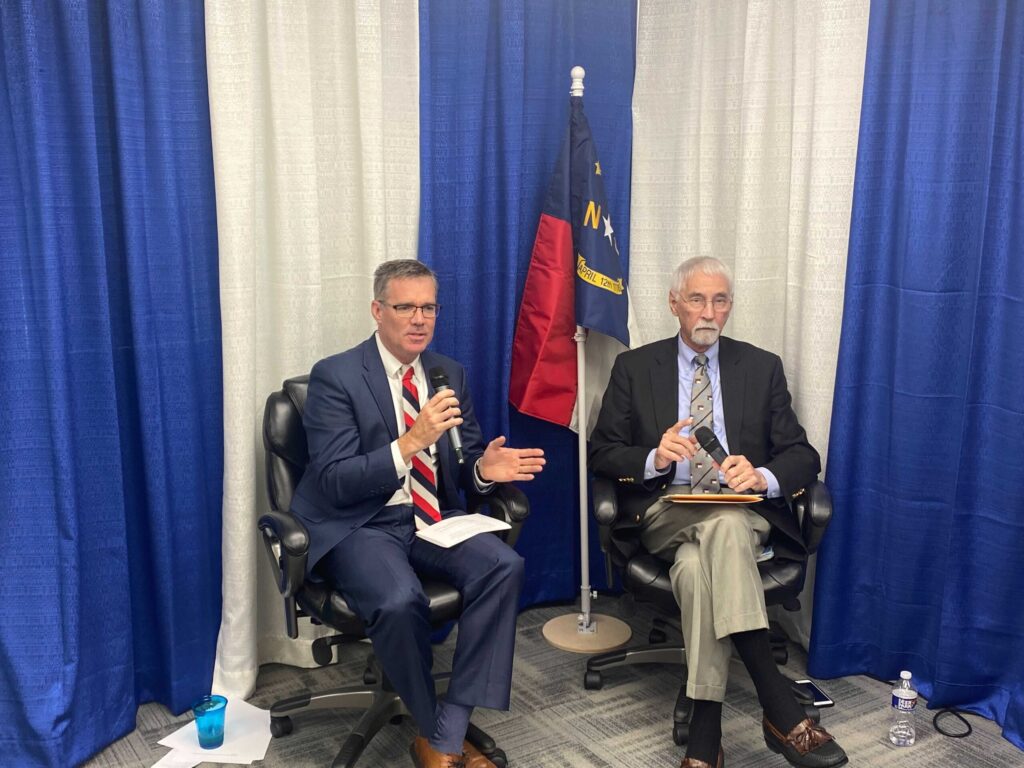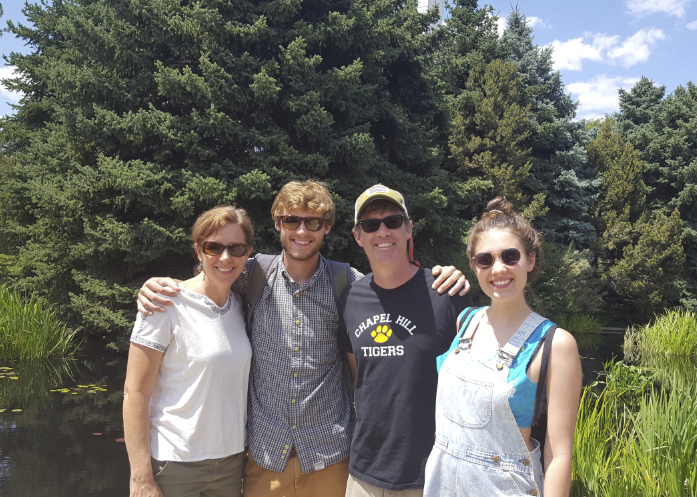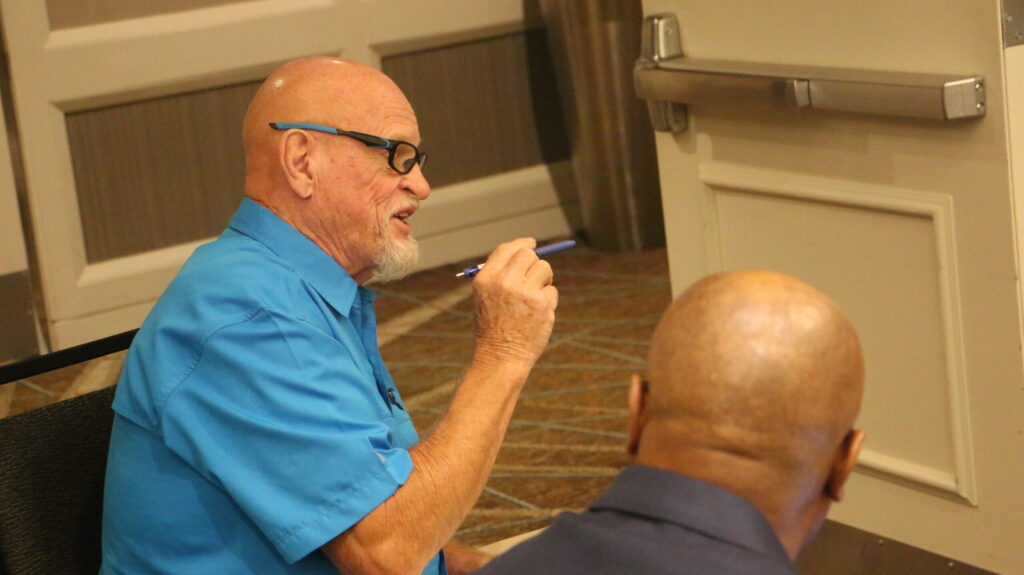LivingPower Newsletter, July/Aug. 2022
When Tim O’Connell went to work part-time for the YMCA as a graduate student at North Carolina State University, he was studying agriculture economics. That part-time job, though, changed the course of his life and turned into a 21+ year career working with nonprofits and advocacy, as he revealed during an interview with outgoing Board President Vann Langston for Celebration of Public Service Week.

“I got to do a little bit of everything. Teach swim lessons, work with day camps,” O’Connell said. “A big part of the work we did was advocacy for health and wellness and community benefits. I cut my teeth on the advocacy pieces there, so that work was very impactful.”
O’Connell went on to become the Executive Director and Vice President of Operations for YMCA of NWNC, followed by time spent as the Associate Executive Director for the North Carolina State University Alumni Association. He most recently served as Director of Advancement Operations, Membership, and Annual Giving for the North Carolina Museum of Art.
Best Candidate for NCRGEA
During the search process led by Board Vice President Martha Sue Hall, O’Connell stood out as a candidate for multiple reasons. One reason was due to the feedback received from others, with overwhelmingly positive comments such as, “Great guy.” “Got results because of people skills.” And “As good as I’ve ever seen with processing information and relating to people.” One person even said, “I learned more under Tim’s leadership than anybody else I’ve ever worked for.”
These comments were complemented by O’Connell’s own views when speaking to the issue of public service. He talked of North Carolina citizens’ desire for clean water, a good education for their children, and great first-responder services.
“We live in one of the top states in the country, and that is so much because of the work public servants have done,” O’Connell shared with Langston in the interview. “It’s time to say thank you. So, thank you to the teachers, the educators, the firemen, the policemen, the administrators who are working and managing the data, and the housekeeping staff working through the pandemic. People who choose to go into public service do it very often for selfless reasons, and we need to honor that.”
Views on Retirement
O’Connell laughed when asked about retirement and talked about how exciting it is that folks are living longer, richer lives. He told a story about an event that happened right before one of his interviews with NCRGEA where a weekend bike ride with a 72-year-old state retiree almost did him in.
“I can remember my father when he retired, he got a rocking chair, but most folks now are not getting rocking chairs. Right now, they’re looking forward to the next stage of life and what’s going to be new in their lives. I think that’s exciting,“ remarked O’Connell. “A big part of the work we want to do is make sure we’re showing the opportunities in that way, so that these retirement years are really enriching and a time for new growth.”
Family and Personal Interests
When it comes to his family, O’Connell is proud of his wife and children’s accomplishments. His wife of 32 years, Beth, is working on her teacher certification after spending over 25 years in corporate communications. His daughter recently wrapped up her last day in the classroom as an elementary art teacher.
“I’m really proud of the work she’s been doing as an educator here in the public school systems,” he said.
His son is a recent graduate from North Carolina State University with a degree in horticulture, and he’s putting that degree to work in Europe. Currently, he is working as a landscape designer in Spain. “It’s so exciting, you know,” O’Connell stated, “to live life as a 22-year-old seeing the world.”
According to O’Connell, he and his family grab any opportunity to spend time being active outdoors. He also enjoys gardening, biking, fly fishing, and watching bees with their hives and finds that these interests spark connections to
work. “Sometimes when I’m out there staring at the hive, I’m not necessarily thinking about the bees. I’m thinking about how people work together, and how do you build a strong community, a strong organization,” he said. “It’s good leadership.”

Connecting with NCRGEA Members
O’Connell talked about the importance of NCRGEA’s increased digital presence to connect with members around the state and ramping it up even further. He also envisions he and his staff will be on the road a lot as they crisscross North Carolina to hold events and get to know members. The organization’s advocacy efforts will be at the forefront, and O’Connell talked about it being a joint effort between the lobbying team and members who need to lobby their own legislators. As he said, “We need everybody to get involved, and your legislator would much rather talk to you in their home district.”
Future Challenges for NCRGEA
“How do we find the right balance of being in the room with somebody and also harnessing the power of technology to stay connected and share information more seamlessly?” O’Connell said.
He discussed how modern retirees, especially the newest ones, live in a different world. They live in a digital world and have jobs that were often digitally based. He believes education surrounding technology for seniors will be a focus. In addition, he talked about how the organization’s potential lies in helping retirees use their collective voices to carry messages back home to their legislators.” I hope our members will feel empowered, but if not, we have great tools to help them feel more empowered,” he commented.
O’Connell ended the interview reiterating the importance of the NCRGEA Executive Director position. “The big thing that excited me about this job was the chance to just again honor and show gratitude to our public servants,’’ he stated. “We need a new narrative around the work of public service and need to make sure that is heard and expressed.”


